by Mahmoud Fouly, Wu Danni
CAIRO, Aug. 7 (Xinhua) -- In the Damietta branch of the Nile River, 40-year-old Yehya Abdullah and his fellow fishermen set out with four boats. But they were not for fish.
Instead, they were hunting the crayfish, a cousin to the freshwater lobster -- a previously unwanted invasive species in Nile until Chinese factories made them profitable.
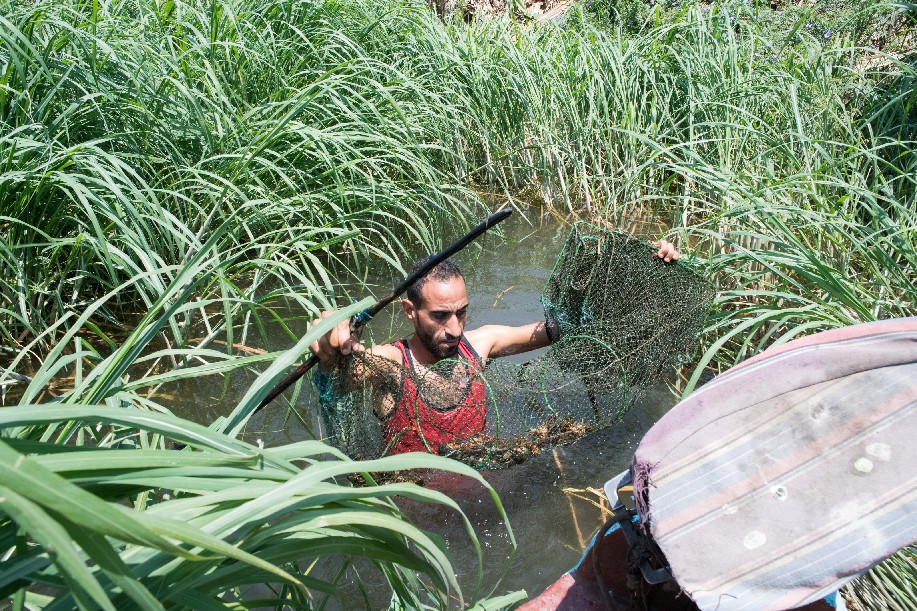
A fisherman hunts crayfish in the Damietta branch of the Nile River in Minufiya province, north to the capital city of Cairo, June 10, 2019. (Xinhua/Wu Huiwo)
Meanwhile, his wife, little daughter and other family members were sorting out and weighing the crayfish. They stored them in white plastic boxes with ice on top in their house yard, overlooking the Nile from a village in Minufiya province, north to the capital city of Cairo.
"The crayfish business has changed my life and the lives of many fishermen and workers in the village after Chinese companies opened factories in Egypt for processing and exporting crayfish, which we used to get rid of as undesirable and harmful species," Abdullah told Xinhua after the crayfish fishing trip.
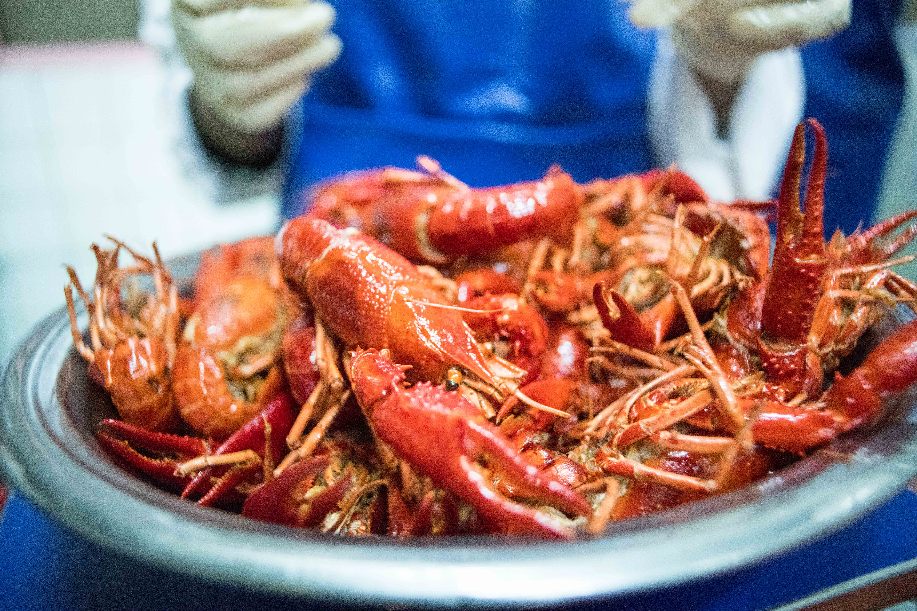
Crayfish are seen at a Chinese factory in the 10th block of Ramadan city of Sharqiya province north of Cairo, Egypt, on May 8, 2019. (Xinhua/Wu Huiwo)
INVADERS
Crayfish first appeared in Egypt in the mid-1990s. They were brought from abroad for an aquaculture experiment while they were young by an investor, who owned a fish farm and thought they were a kind of shrimps.
When the "shrimps" grew up with pairs of pincer-like front walking legs that could cut fishnets, the man dumped them into the Nile River.
They eventually spread along the river from Damietta and Beheira provinces in the north to Aswan province in the south.
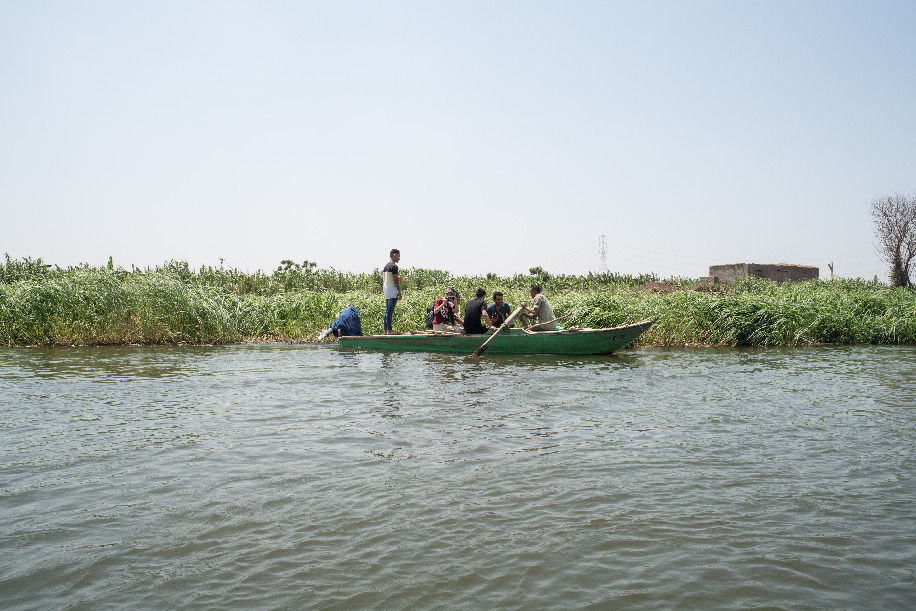
Journalists observe crayfish hunting on a boat in the Damietta branch of the Nile River in Minufiya province, north to the capital city of Cairo, June 10, 2019. (Xinhua/Wu Huiwo)
Media sometimes referred to the newly-appeared crawfish as "river insects," "scorpions" or even "crickets." Fishermen began to complain that the harmful invasive species destroyed fishnets and consumed fish eggs. They were embattled, calling for a way to get rid of crayfish.
Besides, the crayfish were so cheap in the market that people used them mostly to feed catfish.
The crayfish story has been told and heard by more and more Chinese people over the past decade, and they came all the way to Egypt -- with factories.
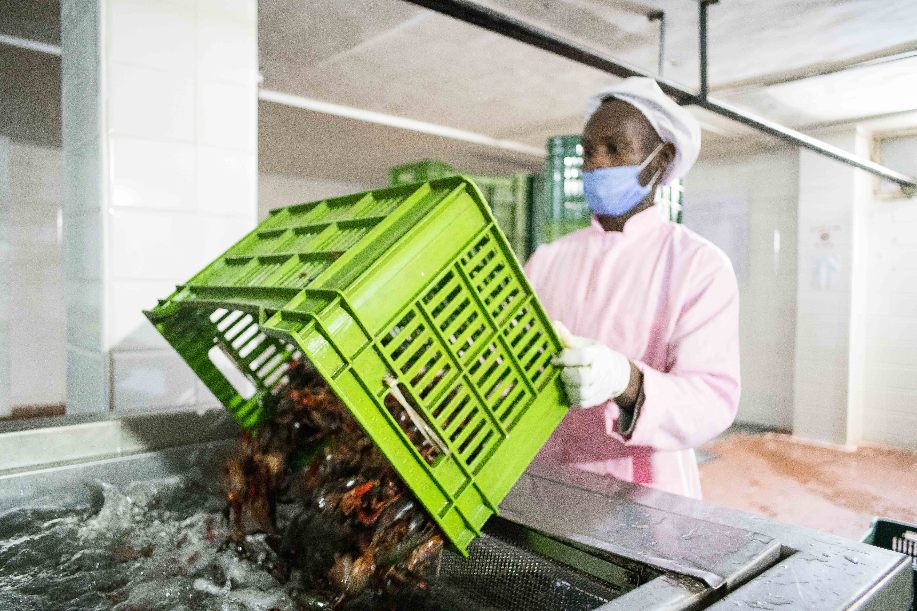
A staff member washes crayfish at a Chinese factory in the 10th block of Ramadan city of Sharqiya province north of Cairo, Egypt, on May 8, 2019. (Xinhua/Wu Huiwo)
CRAYFISH BUSINESS
Abdullah said he started working in a Chinese crayfish factory in Obour city of Qalioubiya province near Cairo in 2013.
"When the business grew, I started to be a crayfish supplier, not just a fisherman," he said.
Now, he collects crayfish from fishermen and provides them to another Chinese factory in the 10th block of Ramadan city of Sharqiya province north of Cairo.
In the 10th block, there lies a huge two-floor Chinese factory named Hot Life, occupying an area of about 9,000 square meters.
The factory, which belongs to Beijing Spice Spirit Food Co., Ltd., looks like a beehive with some 300 workers in the production line in uniform caps, smocks, masks, gloves and safety shoes. The staff include 160 Egyptians, who work in two shifts for 22 hours a day during the crayfish season from April to September.
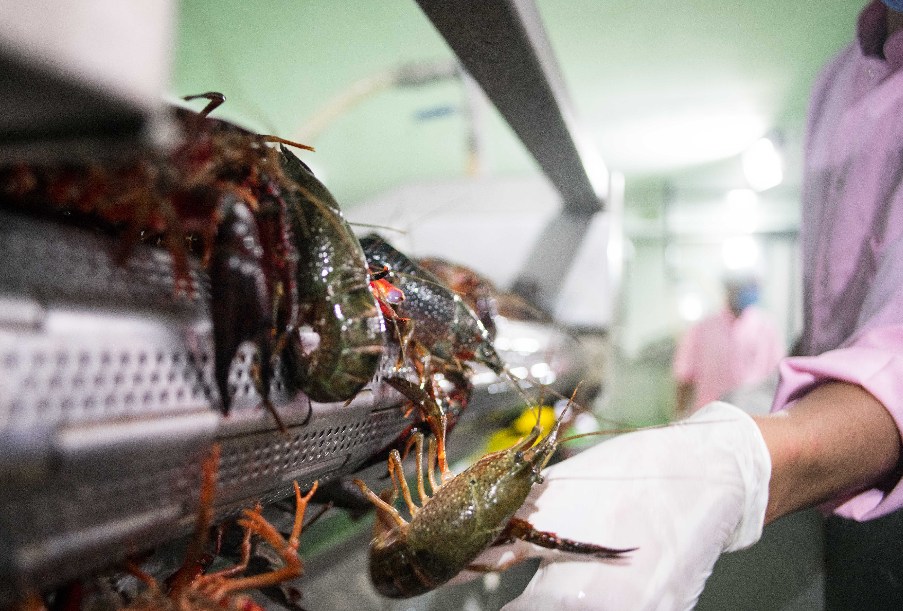
Crayfish are seen at a Chinese factory in the 10th block of Ramadan city of Sharqiya province north of Cairo, Egypt, on May 8, 2019. (Xinhua/Wu Huiwo)
The fresh crayfish go through several processes in different sections and various machines in the factory -- sorting, washing, frying, cooling and finally packaging.
"After that, they are frozen in fridges at -18 degrees Celsius and become ready for export," said quality control manager Karim Mohamed.
Han Dong, chairman and general manager of Beijing Spice Spirit Food Co., Ltd., said the company, which has another factory in Tanta city of Egypt's northern Gharbiya province, has decided to establish a production base in Egypt to build a supply chain from Egyptian fishermen directly to Chinese customers.
"This ensures a better quality and a lower cost at the same time," Han told Xinhua in the factory.
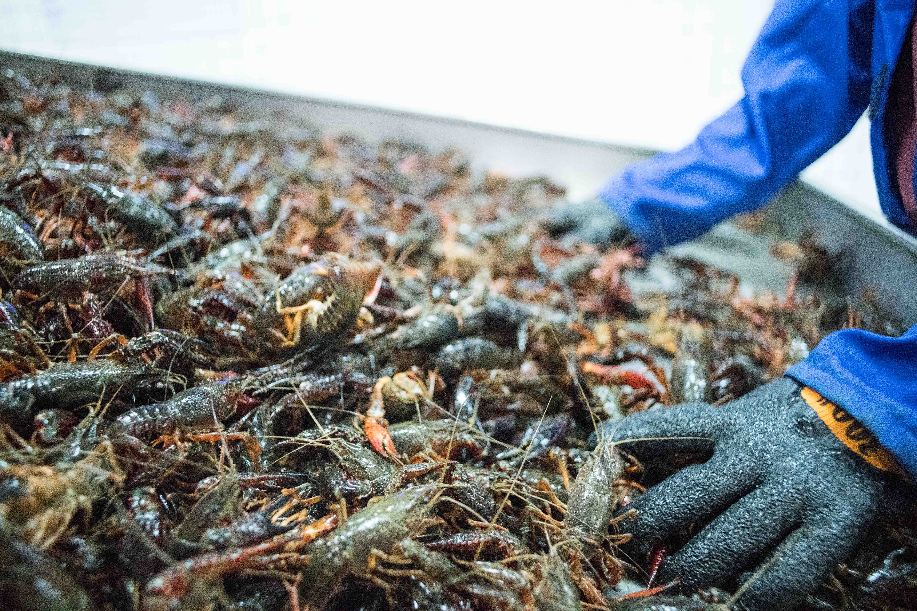
A staff member sorts out crayfish at a Chinese factory in the 10th block of Ramadan city of Sharqiya province north of Cairo, Egypt, on May 8, 2019. (Xinhua/Wu Huiwo)
"All the machines you see in the factory were shipped from China. We spent about four years to design them based on our standards and needs," the Chinese manager pointed out.
Han said the Hot Life was built in 2015 and started production in 2018. It exports over 3,000 tons of processed crayfish annually, and the crayfish industry in Egypt can provide some 50,000 job opportunities.
"The Chinese people were the first foreign investors in crayfish in Egypt," Magdy T. Khalil, professor with the Faculty of Science at the Ain Shams University in Cairo, told Xinhua.
He said that the Chinese investors built the first factory in Egypt for processing and exporting crayfish in 2003, and now the number of factories has increased to about 10. Between 2014 and 2017, 80 percent of the imported crayfish in China came from Egypt.
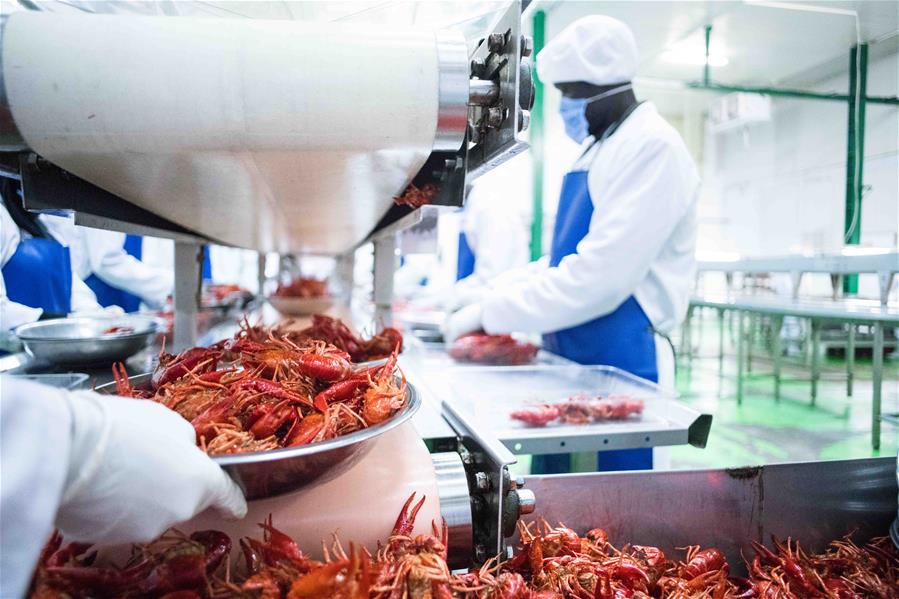
Staff members weigh crayfish at a Chinese factory in the 10th block of Ramadan city of Sharqiya province north of Cairo, Egypt, on May 8, 2019. (Xinhua/Wu Huiwo)
LIFE GETS BETTER
Abdullah now supplies about 3 tons of crayfish a day to the Chinese factory during the six-month harvest season. He has just bought a new car thanks to the expanding business.
In the yard of the house looking over the Nile River, Yara, Abdullah's 13-year-old daughter, sorted out the crayfish in gloves, removing the small ones and the dead before her mother weighed them.
"We dump the dead crayfish and return the young to the river," the little girl said.
"I am not scared of crayfish ... I like this work with my family," she added, noting that she enjoys the taste of cooked crayfish.
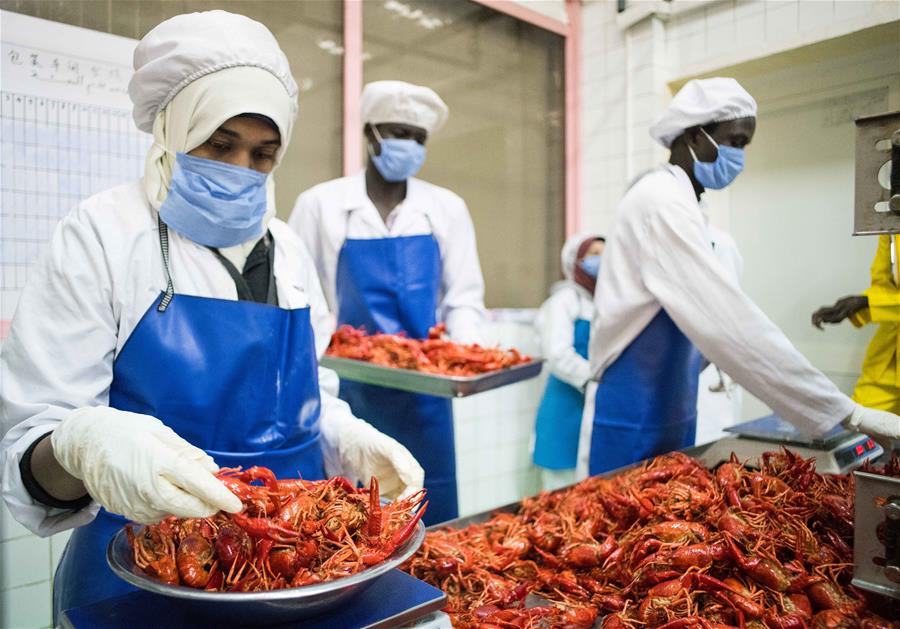
Staff members weigh crayfish at a Chinese factory in the 10th block of Ramadan city of Sharqiya province north of Cairo, Egypt, on May 8, 2019. (Xinhua/Wu Huiwo)
Abdullah's elder brother Sami said that they place the Chinese-style crayfish nets with baits in the water every morning and collect them after 24 hours.
"Hunting crayfish is a double benefit for us, as it provides a chance to add to the Egyptian fish resources and brings a new product to be sold and exported, which is an economic benefit to Egypt," he added.
Sami emphasized that the crayfish business has brought changes to the lives of many Egyptians, including fishermen, suppliers, factory workers, truck drivers and others.
Mohamed Abdel-Moneim, 22, who comes from northern Beheira province, said that working in the Chinese factory made him more ambitious with bigger goals to achieve in his life.
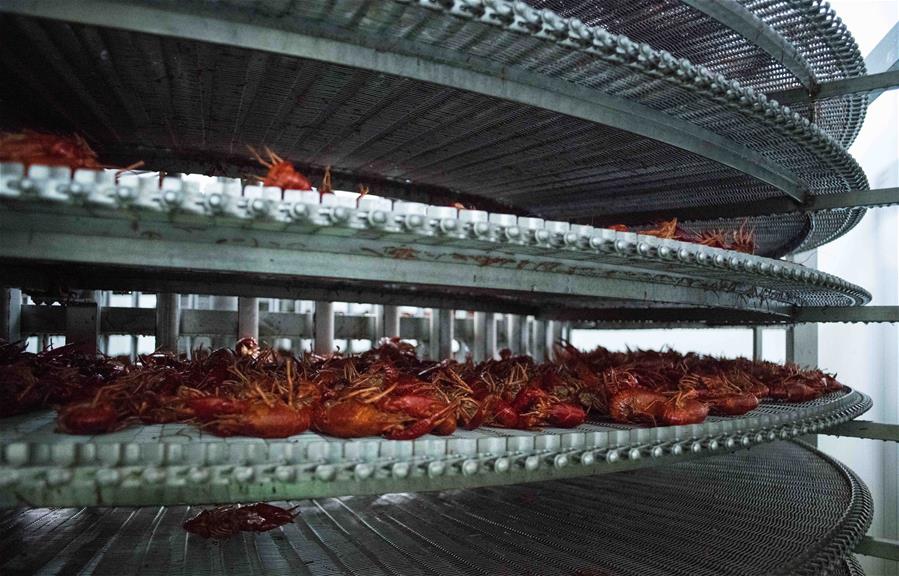
Crayfish are seen at a Chinese factory in the 10th block of Ramadan city of Sharqiya province north of Cairo, Egypt, on May 8, 2019. (Xinhua/Wu Huiwo)
"This is my third year in this factory. I started here as a worker, and was gradually promoted to a general supervisor. This completely changed my life," he told Xinhua at the crayfish cooking hall of the factory.
"It brought up my income and made my life better. They (Chinese companies) also provide us with comfortable staff housing inside the factory. I may go home on vacation for a couple of days every month or skip them for a very good bonus," the young man added enthusiastically.
In a recent lecture, Prof. Khalil said the study suggests that crayfish might be originally from North and South Americas or Eurasia.
"Cooperation with China in crayfish processing and exportation is a win-win situation. It helps Egyptians make use of the invasive species and turn it into an economic plus, and it helps the Chinese investors run profitable businesses here and enjoy freshwater crayfish delicacy in China," Khalil added.
(Marwa Yahya in Cairo also contributed to the story.)
(Video reporters: Cao Peixian, Tang Jiefeng, Wu Danni, Mahmoud Fouly; Video editor: Zhang Yucheng)



